1. Influence — Robert Cialdini
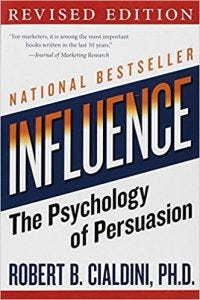
Rating: 8/10
Date of reading: 3rd -15th of January, 2017
Description: How to influence people by using six psychological principles of reciprocity, consistency, social proof, likeability, authority, and scarcity.
Impression: This is a must-read for everyone who wants to sell anything in this world (everyone is selling something). Also, by default, this is a book you need to read as a consumer to know when you’re being sold to (we are being sold every single day from almost every single person in the world). This should be a manual in every school in the world.
Quotes: “There is an obligation to give, an obligation to receive, and an obligation to repay.”
The Effort Extra
Yet another reason that written commitments are so effective is that they require more work than verbal ones. And the evidence is clear that the more effort that goes into a commitment, the greater is its ability to influence the attitudes of the person who made it.
Social scientists have determined that we accept inner responsibility for a behavior when we think we have chosen to perform it in the absence of strong outside pressures. A large reward is one such external pressure. It may get us to perform a certain action, but it won’t get us to accept inner responsibility for the act. Consequently, we won’t feel committed to it. The same is true of a strong threat; it may motivate immediate compliance, but it is unlikely to produce long-term commitment.
2. Unshakeable — Tony Robbins
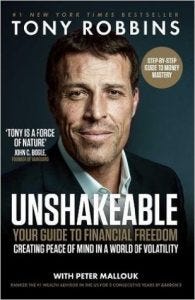
Rating: 7/10
Date of reading: 2nd — 9th of March, 2017
Description: Stock investment is how rich stay rich. Stock investment is how the rich become poor. Stock investment is how the poor become rich. And stock investment is how the poor stay poor. Nuances matter and they are heavily talked about in this book.
Impression: There are two things I got from this book. The first one is that everyone buys, you need to sell and when everyone sells, you should be buying. The second thing is that a diversified portfolio in the S&P 500 index, over time, will beat anything because of the compounding effect.
Quotes: “When a person with experience meets a person with money, the person with experience ends up with the money; and the person with money ends up with an experience.”
“The best opportunities come in times of maximum pessimism.”
3. Start-Up Nation — Dan Senor
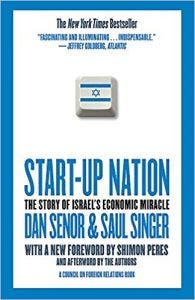
Rating: 7/10
Date of reading: 21st — 24th of March, 2017
Description: Why is Israel a start-up nation, with one of the highest numbers of start-up per capita. How the bottom-up culture helps with this, what is the role of the military and the concept of chutzpah which makes this a breeding ground for start-ups-
Impression: When everyone in the country has a nickname and “street credibility,” then it’s important to behave. The culture pushes people to challenge the obvious, ask questions, and give respect only where it is deserved. Read this to learn about models which can be used for corporate cultures of success.
Quotes: Four guys are standing on a street corner . . .
an American, a Russian, a Chinese man, and an Israeli. . . .
A reporter comes up to the group and says to them:
“Excuse me. . . . What’s your opinion on the meat shortage?”
The American says: What’s a shortage?
The Russian says: What’s meat?
The Chinese man says: What’s an opinion?
The Israeli says: What’s “Excuse me”?
Israelis do not have a very disciplined culture. From the age of zero we are educated to challenge the obvious, ask questions, debate everything, innovate,” says Mooly Eden.
Dadi Perlmutter recalls the shock of an American colleague when he witnessed Israeli corporate
culture for the first time. “When we all emerged [from our meeting], red faced after shouting, he asked
me what was wrong. I told him, ‘Nothing. We reached some good conclusions.’ ”
4. Success Management — Dale Carnegie
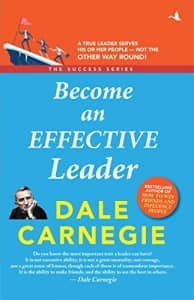
Rating: 4/10
Date of reading: 30th of March — 1st of April, 2017
Description: You will learn the basics of people management. Even though some lessons seem trivial, the devil is always in the details. The fundamentals are fundamentals for a reason — they need to be known inside out.
Impression: I could pretty much sum the lesson from this book with a single sentence — It will teach you how to talk to people.
Quotes: “Happiness doesn’t depend on any external conditions, it is governed by our mental attitude.”
“Rule Number One: Don’t criticize, condemn or complain.”
5. Deep Work — Cal Newport

Rating: 8/10
Date of reading: 17th — 29th of April, 2017
Description: How to use Deep Work to work, succeed, and create value in today’s unfocused world.
Impression: Focus, focus, and focus. Focus on a set of skills that requires deep work, the practice of improving a certain skill for years. But the skills we acquire through that process are skills which are one of a kind and can’t be easily copied or replicated.
Quotes: I shared a graduate student office down the hall from a MacArthur “genius grant” winner — a professor who was hired at MIT before he was old enough to legally drink. It wasn’t uncommon to find this theoretician sitting in the common space, staring at markings on a whiteboard, with a group of visiting scholars arrayed around him, also sitting quietly and staring. This could go on for hours. I’d go to lunch; I’d come back — still staring. This particular professor is hard to reach. He’s not on Twitter and if he doesn’t know you, he’s unlikely to respond to your e-mail.
Last year he published sixteen papers.
If you don’t produce, you won’t thrive — no matter how skilled or talented you are.
6. Barking Up The Wrong Tree — Eric Barker
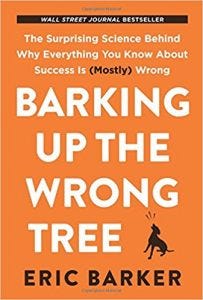
Rating: 9/10
Date of reading: 24th — 30th of July, 2017
Description: This book has the weirdest examples of success I ever read. The book teaches you about cooperation… from the examples of serial killers, gangs, and pirates. If this doesn’t intrigue you to read this book, nothing will.
Impression: This book answers the question about success by debunking the long-held beliefs about success which are just wrong. The author does this through a really funny dichotomy of success lesson (is it who you know or what you know? Is it about belief in yourself… or listening to others? Do quitters never win and winners never quit?)
Quotes: School has clear rules. Life often doesn’t. When there’s no clear path to follow, academic high achievers break down
The same genes that lead to bad stuff can actually lead to great stuff in a different situation. The same knife that can be used to viciously stab someone can also prepare food for your family. Whether the knife is good or bad depends on context.
What if I told you your son’s upper body would be too long, his legs too short, his hands and feet too big, and he’d have gangly arms? I doubt you’d jump for joy. None of those things sounds objectively “good.” But when a knowledgeable swim coach hears those things, he sees nothing but Olympic Gold.
Michael Phelps should be considered one of the X-Men: a mutant with superpowers. Is Phelps physically perfect? Far from it.
7. The War Of Art — Steven Pressfield
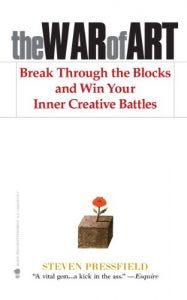
Rating: 9/10
Date of reading: 18th-20th of August, 2017
Description: When you write an entire book about the fear of the blank page known as the Resistance and it becomes a bestseller, then you know you’ve hit the spot with other writers. The Resistance is the fear every single creative (writer) feels when they need to sit down and produce something. You fight this battle every single day of your life. Try to have more days where you win and you will become a successful writer.
Impression: If you think that creative people just have something within them which prevents them from fearing the blank page, then you need to read this book. Both Stephen King and I have the same fear. This book told me that it’s okay to feel how I feel even after writing over half a million article-based words.
Quotes: What’s hard is sitting down to write. What keeps us from sitting down is Resistance.
Are you a writer who doesn’t write, a painter who doesn’t paint, an entrepreneur who never starts a venture? Then you know what Resistance is.
You know, Hitler wanted to be an artist. At eighteen he took his inheritance, seven hundred kronen, and moved to
Vienna to live and study. He applied to the Academy of Fine Arts and later to the School of Architecture. Ever see one of his paintings? Neither have I. Resistance beat him. Call it overstatement but I’ll say it anyway: it was easier for Hitler to start World War II than it was for him to face a blank square of canvas.
8. The Home Service Millionaire — Tommy Mello
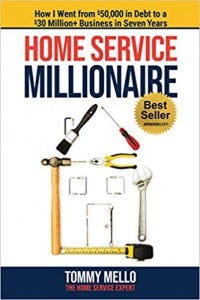
Rating: 6/10
Date of reading: 21st — 25 of August, 2017
Description: How to start a million dollar home service business. Oh, and let’s throw in one more thing to make it even more difficult. You will start it in the middle of the biggest financial crisis the world has ever seen — the 2008 market crash. But Tommy Mello still succeeded and the book is a testament on how he did it.
Impression: How to develop a business mindset, train and lead your employees, how to make effective checklists, how to sell your services and provide the best possible customer service even when you have over 40 employees.
Quotes: “I’m going to be one of your best students because I’m not just doing this as a business, I’m doing this for my business.”
Pick only the top 1% in your industry, listen, learn, emulate, and shoot your goals higher than the rest.
Skilled labor isn’t cheap. Cheap Labor isn’t skilled.
9. Real Artists Don’t Starve — Jeff Goins
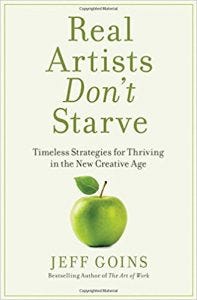
Rating: 8/10
Date of reading: 26th — 31st of August, 2017
Description: How to live from your creative work, whether it’s writing, designing, drawing, or any type of creations. It turns out that the creatives of the past weren’t starving and today, we can emulate that model and live from our art.
Impression: The book taught me how to live with dignity as a writer and how to properly “sell” my art so that I can keep creating more art. I don’t make art to make money. I make money to make more art.
Quotes: Professor Hatfield uncovered a fortune worth roughly $47 million today, making Michelangelo the richest artist of the Renaissance. And to this day, this is a story that surprises us.
So I began to call myself a writer, which was something I did for myself but became a way to declare who I was to the world. The more I did this, the more other people believed it, and therefore the more I believed it. And over time, it became true.
Eventually, you have to decide who you are. You have to choose your role and own that identity. We don’t fake it till we make it. We believe it till we become it.
10. Will It Fly? — Pat Flynn
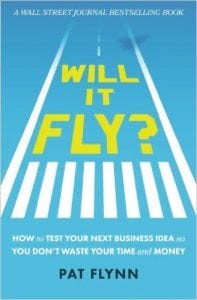
Rating: 6/10
Date of reading: 4th — 14th of September, 2017
Description: A step-by-step process on how to test out your business idea without investing money or (too much) time. The book is simple to read, simple to use, and the author backs the claims by not only research but also by his personal (successful) example.
Impression: Certain things from the book were a repetition from the Ramit Sethi’s book on building an online business, but this book went into more details when it comes to researching and validating your idea. So you can use the best out of both of them to quickly validate your business idea…or move on.
Quotes: The point is our ideas are like these myths. We can assume outcomes one way or another, but until we put a method and data behind it to test those assumptions, we’re risking being pulled into something that seems right, but may prove to be completely wrong. Experimentation will illuminate the truth.
MISSION DESIGN
“Vision without action is a daydream. Action without vision is a nightmare.”
— Japanese Proverb
“You know, I could probably hire someone right now to do whatever it is you’re thinking of doing. So why should I be interested in working with you? What makes you so special?”
“Fear is good. Like self-doubt, fear is an indicator. Fear tells us what we have to do. Remember our rule of thumb: The more scared we are of a work or calling, the more sure we can be that we have to do it.
11. The Millionaire Fastlane — MJ DeMarco

Rating: 9/10
Date of reading: 7th — 14th of October, 2017
Description: This book teaches you how to live rich for the rest of your life. And it does it by explaining the three financial lanes of life. There is the Sidewalk, where people stay poor. This is the reality for most of the people. Then, there is the Slowlane, which is where people slowly accumulate wealth and can enjoy them when they are 65. And then, there is the Fastlane which only a small minority of people follow. The Fastlane track helps you accumulate wealth fast and live life fully.
Impression: I really dislike financial books because they are dry and too formal but this one was the polar opposite. MJ DeMarco hits a home run with his book because he walks the talk and explains how to do it in simple terms which everyone can understand. He has two books and both of them are the Holy Grail of financial books.
Quotes: I made my first million when I was 31. Five years earlier, I was living with my mother. I retired when I was 37.
College was a fiveyear prenatal employee brainwashing with graduation as the overrated climax. I viewed college as indoctrination into corporate droneship; an unfulfilled marriage between me and a life of jobs, bosses, and being overworked and underpaid.
When you make your first million, it will be because of process and not some clandestine happenstance that just happened to waltz across your path. Process is the road trip to wealth: The destination shines as an event, but it’s found by process. Yes, the elevator to success is out-of-order — you will need to labor up the stairs.
12. Side Hustle — Chris Guillebeau
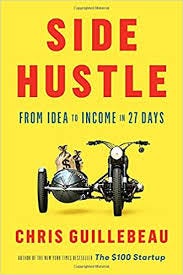
Rating: 7/10
Date of reading: 30th of October — 6th of November, 2017
Description: How to create a side hustle (defined in the book by the monthly income of $400–3000).
Impression: Chris Guillebeau has a really interesting way of telling stories so this was the first book I read from him, but not the last one. Side Hustle is divided into 27 “chapters” and each and every one of them serves as one day in your side hustle. An easy book to read, a bit more challenging to implement, but the results you can get from it are 10–50X invested.
Quotes:
✓ Do you like the idea of having more than one source of income?
✓ Are you willing to devote at least thirty minutes a day to building your hustle, for at least the next twenty-seven days?
If you answered Yes, this plan is for you.
When you build something for yourself, even as you continue to work your day job, you become empowered. You gain confidence. You create security, both in the form of that extra cash and also in the fact that you’re opening up future opportunities for yourself. So right from the beginning of this journey, start thinking about your future.
13. The School of Greatness — Lewis Howes
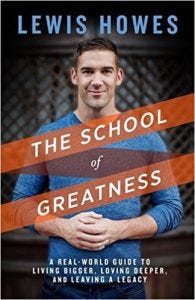
Rating: 7/10
Date of reading: 16th — 24th of November, 2017
Description: The School of Greatness is the name of a popular podcast started by Lewis Howes and the book “steals” the same name. It’s about finding your life’s vision when your primary purpose has been shut down (Howes needed to stop playing American football because of an injury) and how to actually make it happen.
Impression: What I love about Lewis Howes is that he acknowledges that he is ignorant and that he doesn’t know a lot. And that’s why he invites people on his podcast to teach him about their knowledge and expertise. He does the same thing with his book, not pretending to know stuff and asking for advice from knowledgable people.
Quotes: The only thing worse than being blind is having sight but no vision.
— Helen Keller
“Successful and unsuccessful people do not vary greatly in their abilities. They vary in their desires to reach their potential.”
When adversity arises, you have two choices: (1) Do nothing, let it overwhelm you, and fall victim to your circumstances, or (2) embrace the challenge and move toward the adversity, making it part of your success story. Prepare yourself for these moments, because they are going to happen in all areas of your life whether you like it or not. When you understand this and learn to embrace adversity, then you can learn to overcome it and use it to your advantage.
14. The Compound Effect — Darren Hardy
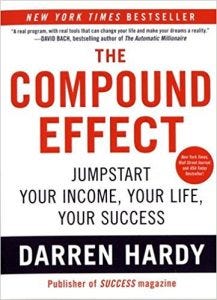
Rating: 9/10
Date of reading: 31st of December 2017–5th of January 2018
Description: How to make compound effect (the 8th wonder of the world according to Einstein) work for you. It’s about small, daily actions repeated over the course of years which create success. And this is not just applicable to business. If you eat 100 fewer calories a day (a single loaf of bread or a slice of cheese), you will lose 30 pounds in two and a half years.
Impression: The compound effect changed my life completely. I’ve been reading 20 pages of a book a day and in two and a half years, I read 100 books. I wrote 500 words a day and in less than two years, wrote half a million words. Heck, I went by foot on a pilgrimage of Santiago el Camino (175 miles). I crossed it by going one step at a time.
Quotes: The Compound Effect is based on a principle I’ve used in my own life and training; that is, your decisions shape your destiny. The future is what you make of it. Little, everyday decisions will either take you to the life you desire or to disaster by default. In fact, it’s the littlest decisions that shape our lives.
Here’s the bottom line: You already know all that you need to succeed. You don’t need to learn anything more. If all we needed was more information, everyone with an Internet connection would live in a mansion, have abs of steel, and be blissfully happy. New or more information is not what you need — a new plan of action is. It’s time to create new behaviors and habits that are oriented away from sabotage and toward success. It’s that simple.
You can also read The Compound Effect Book Summary on Growthabit.
15. The Motivation Myth — Jeff Haden
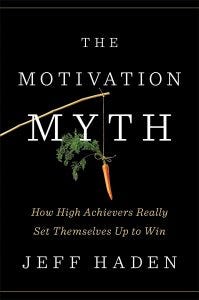
Rating: 8/10
Date of reading: 31st of August — 4th of September, 2018
Description: This was a book to read! Jeff Haden shows us the process behind the world’s most successful people in sports, business, and life in general. The examples all focus on the process behind the results, the discipline behind the apparent “motivation” and a ton of patience every single one of the successful people had (and still have).
Impression: Jeff Haden is a long time Inc.com contributor so he writes for the audience. And that means clear and concise, a lot of stories, short paragraphs, and impactful stories. The book is half-manual, half-book for people who want to learn the skill of discipline and process to achieve results. And damn, it resonated deeply with me.
Quotes: And most of all, thanks for proving what many people unfortunately choose not to believe: that if you are willing to work hard and stay the course, who you are is more than enough for you to become who you really want to be.
Incredibly successful people set a goal and then focus all their attention on the process necessary to achieve that goal. They set a goal and then, surprisingly, they forget the goal.
16. How To Fail At Almost Everything And Still Win Big — Scott Adams
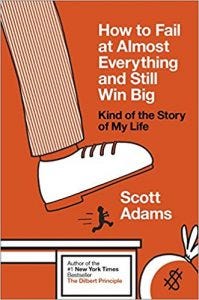
Rating: 8/10
Date of reading: 5th — 12th of September, 2018
Description: From the creator of Dilbert comes a book like none before. The author literally calls himself a failure like 100 times in the book, the self-deprecating humor is masterful and it really hits the nail because it resonates with an innate human feeling about themselves — we are losers and success is for those people “out there.” Scott Adams shows you how the people out there are really people like you. And he does it better than anyone else.
Impression: There are certain beliefs we have deep within us, no matter what we do in life. Some call it the imposter syndrome, some call trauma, other’s think it’s a character trait, but no matter what you name it, everyone knows the feeling. Scott still feels like that- he is just like us- but he shows us how you can just make it once and that it will be enough. Thank you, Scott, in the name of all losers in the world.
Quotes: On top of that, I’m getting paid to write this book, and we all know that money distorts truth like a hippo in a thong. And let’s not forget I’m a stranger to most of you. It’s never a good idea to trust strangers.
The senior vice president told me that my suggestions for improving the bank were underwhelming, but he liked my sense of humor, and because of that he had a hunch about my potential. A month later I started the management training program. Somehow I had failed my way to a much better job. In my eight years at the bank, I was incompetent at one job after another.
17. Unscripted — MJ DeMarco

Rating: 10/10
Date of reading: 13th — 26th of September, 2018
Description: Zero filter, zero bullshit story of success, entrepreneurship, and true freedom, liberty, and wealth from the “real-est” entrepreneur out there — MJ DeMarco. If you want to read some beautiful language, learn a ton about entrepreneurship, and make it in a non-bullshit way, then Unscripted is for you.
Impression: The lessons inside this book should be taught inside every business class in every school in the world. You will not only learn a lot but certain elements of the book will hit you right in the face…with a brick. For me, it was action-faking, a feeling of doing something good and useful which is, at that moment, completely useless for my business. If you have problems in your entrepreneurship world and life, this book will solve them. All of them.
Quotes: During production, publishing “experts” warned that my book would never sell. Those same experts also said I was committing the ultimate author sacrilege: I wasn’t pushing readers into a “back-end sales funnel”, ya know, so I could sell you a coaching seminar costing as much as a Cadillac.
Well, I didn’t give a shit.
I was writing from my heart. Not for fame, fortune, or some egocentric motive that could catapult me into the privileged world of gurus and seminar hustlers.
You’re living, but you aren’t alive.
Your heart beats, but there is no pulse.
Your mind is poisoned, but the toxicology is clean.
Your soul has been stolen, but there are no thieves.
Suspicion has swelled while the incongruity gnaws.
Yes, this wasn’t the life you signed up for.
This wasn’t your plan.
Something is wrong.
18. The Third Door — Alex Banayan
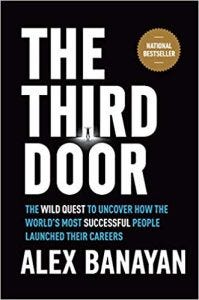
Rating: 6/10
Date of reading: 11th — 15th of October, 2018
Description: The best question you can ask a successful person isn’t how they made it in their life, but what would their course of action be if they were in your particular position. Alex Banayan wanted an answer to that question, but he never found those pieces of information anywhere. So he decided to find the successful people he admired and asked them that answer. Oh, in the meantime he recorded the answers in what was the most successful business book of 2018 — The Third Door.
Impression: This is a guy who doesn’t take no for an answer and he always finds a way (hence, the third door reference). I liked the stories and the adventures from the book, but I didn’t like the approach toward success in the book. It just felt too fast and hectic and it wasn’t based on any particular skill (hustle mode). I love people who mastered their craft for years and made it because of that.
Quotes: Life, business, success…it’s just like a nightclub.
There are always three ways in.
There’s the First Door: the main entrance, where the line curves around the block; where 99 percent of people wait around, hoping to get in.
There’s the Second Door: the VIP entrance, where the billionaires, celebrities, and the
people born into it slip through.
But what no one tells you is that there is always, always…the Third Door. It’s the entrance where you have to jump out of line, run down the alley, bang on the door a hundred times, crack open the window, sneak through the kitchen — there’s always a way. Whether it’s how Bill Gates sold his first piece of software or how Steven Spielberg became the youngest studio director in Hollywood history, they all took…the Third Door.
Many times the hardest part about achieving a dream isn’t actually achieving it — it’s stepping through your fear of the unknown when you don’t have a plan.
19. Bad Blood — John Carreyrou
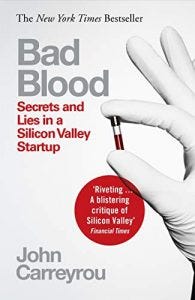
Rating: 9/10
Date of reading: 1st — 5th of November, 2018
Description: How a $15 billion company with more than 1000 employees was actually a lie with a product which doesn’t work. Horrifying story of today’s Enron — Theranos.
Impression: What makes this book super scary is that it’s a true story of how a couple of people managed to lie to thousands of people to get what they want and they actually succeeded at that. The writing in the book is riveting and the story makes it a page-turner. Recommend to anyone who wants to know where the line in the sand is drawn.
Quotes: He quit two days later. His resignation email read in part:
good luck and please do read those books, watch The Office, and believe in the people who disagree with you…Lying is a disgusting habit, and it flows through the conversations here like it’s our own currency. The cultural disease here is what we should be curing before we try to tackle obesity…I mean no ill will towards you, since you believe in what I was doing and hoped I would succeed at Theranos. I feel like I owe you this bad attempt at an exit interview since we have no HR to officially record it.
Hunter had placed calls to pharmaceutical companies and hadn’t been able to get anyone on the phone to confirm what Theranos was claiming, though that was hardly proof of anything. He now asked Van den Hooff to show him the Johns Hopkins review. After some hesitation, Van den Hooff reluctantly handed him a two-page document. When Hunter was done reading it, he almost laughed. It was a letter dated April 27, 2010, summarizing a meeting Elizabeth and Sunny had had with Dr. J and five university representatives on the Hopkins campus in Baltimore. It stated that they had shown the Hopkins team “proprietary data on test performance” and that Hopkins had deemed the technology “novel and sound.” But it also made clear that the university had conducted no independent verification of its own. In fact, the letter included a disclaimer at the bottom of the second page: “The materials provided in no way signify an endorsement by Johns Hopkins Medicine to any product or service.”
20. So Good They Can’t Ignore You — Cal Newport
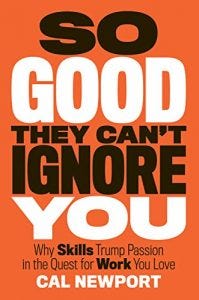
Rating: 8/10
Date of reading: 11th — 14th of November, 2018
Description: Most people tell you to follow your passion to be happy. Cal Newport tells you the exact opposite. Don’t follow your passion, build a skill set which can’t be replicated and then start doing that. When you become good at something, your passion for that exact thing will emerge because you will be so good they can’t ignore you. Don’t do what you love. Love what you do.
Impression: The book is really easy to follow, the stories are interesting, and the lessons you can learn from life can literally change your life (for better). Most people are unrealistic when it comes to their wants. But the way forward is by building a skillset and then making yourself indispensable at it. Then, and only then, will you start loving what you do (because you’re good at it) and passion will follow.
Quotes: In the last chapter I offered a bold proposition: If you want to love what you do, abandon the passion mindset (“what can the world offer me?”) and instead adopt the craftsman mindset (“what can I offer the world?”).
In the 1990s, this was a relevant question. There was debate in the chess world at the time surrounding the best strategies for improving. One camp thought tournament play was crucial, as it provides practice with tight time limits and working through distractions. The other camp, however, emphasized serious study — pouring over books and using teachers to help identify and then eliminate weaknesses. When surveyed, the participants in Charness’s study thought tournament play was probably the right answer. The participants, as it turns out, were wrong.
21. Talent Is Overrated — Geoff Colvin
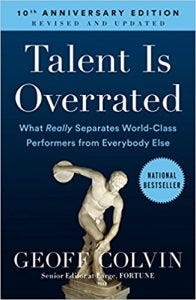
Rating: 8/10
Date of reading: 22nd — 27th of November, 2018
Description: Book with the same topic as the previous one — deliberate practice. But the major difference is that Talent Is Overrated wasn’t’ written by a scientist, but by a writer which makes this book easier to read and easier to implement.
Impression: This is a more customer-friendly book which explains the principles of deliberate practice. You even have some routine and training plans inside of it which help you out create your own routines. This is a must-read for anyone who is on the path to mastery.
Quotes: In field after field, when it came to centrally important skills — stockbrokers recommending stocks, parole officers predicting recidivism, college admissions officials judging applicants — people with lots of experience were no better at their jobs than those with very little experience.
The costs of being less than truly world class are growing, as are the rewards of being genuinely great.
22. The Coaching Habit — Michael Bungay Stanier
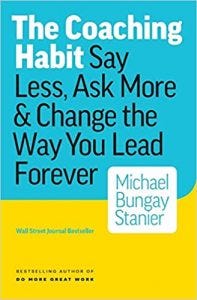
Rating: 4/10
Date of reading: 28th of November — 2nd of December, 2018
Description: Seven questions you need to ask during coaching which are super effective. Nothing more, nothing less.
Impression: This book wasn’t that useful for me because I don’t work with teams directly, but I could still take out certain questions and themes for conversations with friends, clients, and family members who are struggling with certain things in their lives (business, university, love life).
Quotes: You may find that you’ve become part of an overdependent team. There’s a double whammy here. First, you’ve trained your people to become excessively reliant on you, a situation that turns out to be disempowering for them and frustrating for you. Everyone loses momentum and motivation. The more you help your people, the more they seem to need your help. The more they need your help, the more time you spend helping them.
When people start talking to you about the challenge at hand, what’s essential to remember is that what they’re laying out for you is rarely the actual problem. And when you start jumping in to fix things, things go off the rails in three ways: you work on the wrong problem; you do the work your team should be doing; and the work doesn’t get done.
